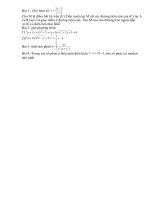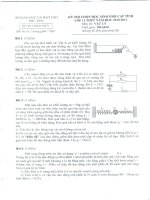mong thay co giai giup em voi
Bạn đang xem bản rút gọn của tài liệu. Xem và tải ngay bản đầy đủ của tài liệu tại đây (4.62 MB, 4 trang )
<span class='text_page_counter'>(1)</span><div class='page_container' data-page=1>
(od'ffrc'-i^tfu 4 '.,[ vtL)
PART ONE: READING COMPREHENSION
l . Fill in each blank with a suituble word or phrase taken from the box.
ask accommodate hear had better having
so that took without who whose
temper heard for classes live neither can I
to have behave catched classified sunilse
in order to' caught ages alTestmg asking
1 . Only a few ofthe sounds
produced
by insects
can
be ... .. ...
. ... ... by humans.
2. "You,...
not lend him any more money,
Elizabeth,"
said John.
3. ltis... since
Alice visited
her parents
and
relatives
in the US.
4. Mary will spend one year working abroad
she can find out how things operate
overseas.
5. My sister
can't
play
termis
tomorrow
and
...
6. She
left
the
office
...
saying
anything
to anybody.
7. She
always
enjols ..,...,...
lunch
in a restaurant
near
her howe.
8.Howarethebooksinthelibraryinyouruniversity...?
9.Alltheprisonerswillb€...
bythepolicesoon.
10.
Don't
invite
John
to dinner;
I can't
stand
his bad
...
I 1 . We reached
the top of the mountain before
12. The ancient
building was too small
to
....all the foreign
tourists.
13. The two old ladies
..lived next door were
called
Janet
and Martha.
14. When students
register
late.
...
<sub>, they must </sub>
pay an additional
fee.
15. Peter regretted
.Arthur to lend him 200 dollars to buy the T-shirt.
2. Read thefollowing passages
carefully and answer
the questions
belout.
Passage
I
Hemingway
is well-known in the world today. To many people in the US, Hemingway was considered
as a great man and writer. The whole of his creative
work was a long struggle,
for Hemingway,
the man and the
writer, had many enemies.
Perhaps
his great enemy was war. He hated it with all his heart, with his whole body,
in which 28 bullets had left their faces.
Hemingway hated those who made a business
of war. In an introduction to his novel 'A Farewell to
Arms', Hemingway
said that wars were started by people
who profited from them, and he suggested
that those
warlike people
should be shot on the very first day of war, by sentence
of the people.
Hemingway
hated fascism.
He never surrendered.
He fought against
it with the pen and the sword.
l. What did many American people regard Hemingway
as?
2. Why was the whole of his creative work a long struggle?
3. How did Hemingway hate war?
4. Did he love people who made a business of war?
5. What was Hemingway's attitude to fascism?
Passage
2
One summer
afternoon
Jean and Michelle Duboit, an elderly oouple, visited their daughter
at her home
in Lille, France.
A few minutes
before six o'clock,
the Duboits decided
to leave.
They said goodbye
to t}te
daughter,
walked to their car, and got in. They expected
a quiet, safe ride home. The ride, however, was not
quiet and safe.
</div>
<span class='text_page_counter'>(2)</span><div class='page_container' data-page=2>
!
'
{ttJ
<sub>"rirn </sub>
t,
<sub>ltr'11rj .ri,, </sub>
-i',*':i.'ii.
"All riglrt," said Mr. Duboit. "Iil d.iv"'you *y*h"re you want to go. But first let my wife out of the car.
She can't stand long joumeys, you know."
1. Where did Jean and Michelle Duboit visit their dauehler?
2. What was the ride home like?
3. What did the sunman want Mr. Duboit to do?
4. Did Mr. Duboit agree with the gunman's cornmand?
5. What did h/fu. Duboit request the gunman?
Passage
3
The general
opinion abroad
is that London has fog or rain or both, every day of the year, but on the day
that I anived it was fine and warm, there was brigirt sun and a cloudless sky. The next day it was just as
beautifirl; tlere was a slight wind that gently moved the leaves
on the trees, and you could smell the spring in
the air. "Life is grand!' I thought as I walked in Kensington
Gardens.
It was a straight road and I found the way
quite easily. When I got my first sight of the gardens,
the beauty of it nearly took my breath away. The trees
were just bursting into leaf, fresh and green and lovely, and there were beds of spring flowers, red and yellow
and blue, in the beautiful, smootl grass
under the trees.
People
in the light spring clothes were walking about, and, to my surprise,
they walked not only along
the paths but also across
the grass, and no one said a word to them about it. I had never seen such a thing
before-1. What was the wealher
like on the day the writer anived in London?
2. What is the weather like in London according to the general opinion abroad?
3. What season was it when the writer visited London?
4. What did he see in the Kensineton Gardens?
5. What was the strange thing in the Kensington Gardens that he saw?
Passage
4
Sir Winston
Churchil (1874-1965)
was the greatest
British statesman
of modem
times.
During
his long,
colourful public career,
he was a Member of Parliament
for 63 years. He also held almost every goverffnent
post. And most important of all, he led the counlry to victory in World War II. He also wrote many important
books and was a talented
painter.
In May 1940,
he became
Prime Minister. Throughout
the war, Churchill showed
great strength
and energy.
He worked for long periods with little sleep and traveled many thousands of miles. By courage and
determination
expressed
in his speeches,
he inspired the people of Britain to keep on fighting. In the general
election at the end of the war, the Conservative
Party, of which he was the leader,
was defeated.
But he became
Prime Minister
again
in 1951.
He resigned
as Prime
Minister
in 1955.
1. \\fhen did Churchill frrst become
Prime Minister?
</div>
<span class='text_page_counter'>(3)</span><div class='page_container' data-page=3>
4. When did he resign as Prime Minister?
5, How long was Winston Churchill a Member of Parliament?
3. Read the passage carefully and thenJill in each blank wilh ONE suitable word.
Long ago in Wales there was a handsome young prince called Llewellyn. He was very (1)
of hunting and often (2) ... to go out into the forests and mountains with his
favorite huntingdog, (3) ... name was Gelert. One day, however, he left Gelert (4) ...
home to guard his baby son who was only a (5) months old. In the evening when the prince
retumed (6) -... hunting he saw that his house was in a terrible mess. The furniture (7)
been knocked over and there was blood (8) . the walls. He could not find his
baby son. Then he saw his dog Gelert running towards him, covered in blood. The prince believed that the dog
had attacked and (9)... ... .. .. .. .. .. . . ... his son.
Howdver, when he looked around his house (10)...carefirlly, he fomd his son lying
under a chair, alive and well. Then he saw the dead body of a huge wolf. He realized that Gelert.had protected
his son's life by frghting and killing the wolf.
PARTTWO: WRITING
l. Make all the changes and additions necessary to produce complete sentences from the following sets of
words ond phrases.
Example: She / start / work / secretary /fve years ago.
Answer : <sub>She started working as a secretary five years </sub>
ctgo-1. I / interested / read / article / global warming/newspaper/yesterday. <sub>.</sub>
2. Would / mind /lend / motorbike / until / next weekend?
3. We / go I airport / see / him I off I last Sunday.
4.It I difficult I us I get I touch / manager / because / he / busy I day.
5. We look forward / welcome / Professor Brcwn I near future.
6. When we /visit I town / last month I thev / build I new school.
7 .lt I important / witness / tell / truth.
8. When I / younger / used / walk / long distances.
9.Itlsuch/ lovely weather /we / spend / whole day lgarden /last Saturday.
10. His parents /prefer I stay / home I go lcinema.
2, Rewrite the following senlences using cue words at the beginning of each sentence so that the second
senlence has the same nuaning as the !ilst
Example: <sub>Lan is too young to see the film.</sub>
Answer: Lan is so young that she cannot see thefilm.
1. The patients find it diffrcult to meet the doctor.
I t ' s . .
?.
"I'm sorry
that I broke the glass,"
said
Peter.
</div>
<span class='text_page_counter'>(4)</span><div class='page_container' data-page=4>
\
3. I was drowning but he saved me.
I f h e . . . , .
4. These new marhines have put an end to queuing.
Before these
5. The directors have just signed the contract.
The contract
6. We can't afford to buy the car.
T h e c a r . . . . .. . . . . .
7 . His parents made him study for his exams.
H e w a S . . . .
8. We started cooking for the party four hours ago.
We have
9. He has never behaved so violently before.
He is behaving
10. The boys hardly passed the exam due to their laziness.
IJa"rIl v
3. Tronslation
A. Translale the following senlences into English:
1. Hq phai mAt s6u th6ng dO xAy xong cdn nhd do.
. . . .
2. Trongthoi dai chung ta, vdn AC O nhiSm dang ngay cdng trd thinh mQt v6n d€ quOc t€.
3. Ngdy nay, klroa hgc vd cdng nghd ttd thay ddi hoan toen cu6c s6ng con ngucri.
" " . ' " . ' , ' " " " : " . ' " : " " " " " " " '
4. Trong cuQc s6ng chung ta, tti6n v6 cirng quan figng. DiQn gitp con ngudi n'iu dn, giao tii5p, vd thu giln.
5. Ngiy nay tin hoc tro n€n ph6 bi€n kh6ng nhting dOi voi nguoi l6n md cdn cA trd em nira.
B. Translale the following sentences into Vietnamzse:
6. With the ever-increasing threat of home fires, Americans are choosing smoke-alarm systems that can be
easily installed as warning devices in residences.
7 . Traffic jams remain a serious problem in many big cities, especially in the rush hours.
8. Day classes are held five days a week and evening classes are held from Monday to Saturday.
9. Special devices have been made available to place on roofs ofhouses to hap the sun ray and thus heat water
or provide electrical appliances with power.
10. Two weeks before his deafl1 Afred Nobel set up a fund for rewarding prizes to those who devoted
worthwhile contributions to mankind.
</div>
<!--links-->









